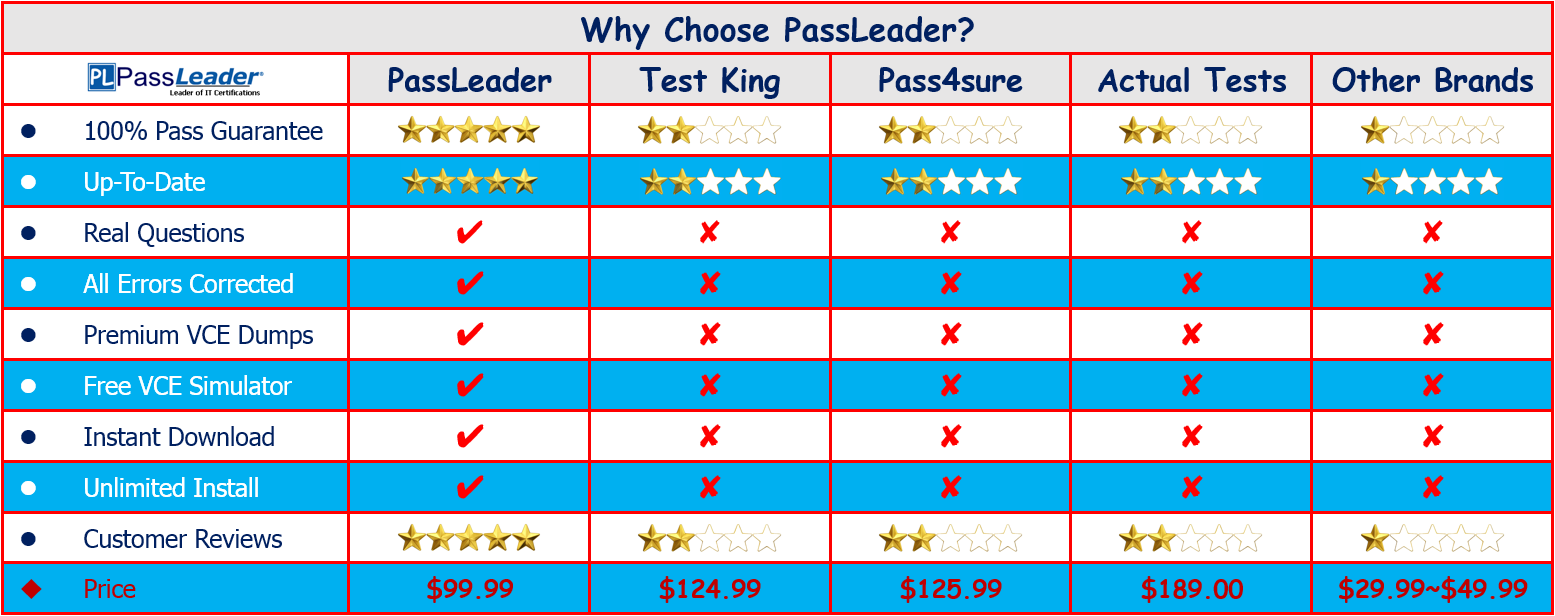Pass 200-310 exam easily by learning PassLeader 200-310 exam dumps! PassLeader just updated the 221q 200-310 exam questions, the new 200-310 VCE or PDF practice tests cover all the real questions, which will help you passing 200-310 exam easily. What’s more, PassLeader’s new 200-310 VCE dumps and PDF dumps have corrected many wrong answers, which is not available in other free 200-310 VCE dumps, it will ensure you 100 percent passing 200-310 exam!
keywords: 200-310 exam,221q 200-310 exam dumps,221q 200-310 exam questions,200-310 pdf dumps,200-310 vce dumps,200-310 study guide,200-310 practice test,CCDA — Designing for Cisco Internetwork Solutions Exam
QUESTION 41
Which three sources does a network designer use to collect information for characterizing an existing network? (Choose three.)
A. staff input
B. visual inventory
C. network audit
D. traffic analysis
E. server statistics
Answer: ACD
QUESTION 42
What is the primary consideration when choosing a routed network design over a traditional campus network design?
A. Layer 3 service support at the network edge
B. the routing protocol choice: open (OSPF) or proprietary (EIGRP)
C. the routing abilities of the host devices
D. the need to control the broadcast domains within the campus core
Answer: A
QUESTION 43
Which statement is true concerning the data center access layer design?
A. The access layer in the data center is typically built at Layer 3, which allows for better sharing of services across multiple servers.
B. With Layer 2 access, the default gateway for the servers can be configured at the access or aggregation layer.
C. A dual-homing NIC requires a VLAN or trunk between the two access switches to support the dual IP addresses on the two server links to two separate switches.
D. The access layer is normally not required, as dual homing is standard from the servers to the aggregation layer.
Answer: B
QUESTION 44
Which statement is true concerning the data center distribution (aggregation) layer design?
A. With Layer 3 at the aggregation layer, the physical loops in the topology must still be managed by STP.
B. The boundary between Layer 2 and Layer 3 must reside in the multilayer switches, independent of any other devices.
C. A mix of both Layer 2 and Layer 3 access is the most optimal.
D. In a small data center, the aggregation layer can connect directly to the campus core, exchanging IP routes and MAC address tables.
Answer: C
QUESTION 45
When considering the three VoIP design models – single site, centralized multisite, and distributed multisite — which question below would help to eliminate one of the options?
A. Will the switches be required to provide inline power?
B. Will users need to make offsite calls, beyond the enterprise?
C. Will users require applications such as voice mail and interactive voice response?
D. Are there users whose only enterprise access is via a QoS-enabled WAN?
Answer: D
QUESTION 46
With deterministic Wireless LAN Controller redundancy design, the different options available to the designer have their own strengths. Which statement is an example of such a strength?
A. Dynamic load balancing, or salt-and-pepper access point design, avoids the potential impact of oversubscription on aggregate network performance.
B. N+N redundancy configuration allows logically grouping access points on controllers to minimize intercontroller roaming events.
C. N+N+1 redundancy configuration has the least impact to system management because all of the controllers are colocated in an NOC or data center.
D. N+1 redundancy configuration uses Layer 3 intercontroller roaming, maintaining traffic on the same subnet for more efficiency.
Answer: B
QUESTION 47
When there is a need for immunity to EMI for connecting locations that are greater than 100 meters apart, which two solutions can be utilized? (Choose two.)
A. multimode fiber
B. Fibre Channel
C. HVDC transmission lines
D. single-mode fiber
E. serial RS-232
F. Gigabit Ethernet 1000BASE-CX
Answer: AD
QUESTION 48
Which mode is used to exclusively look for unauthorized access points?
A. monitor mode
B. sniffer mode
C. rogue detector mode
D. local mode
Answer: C
QUESTION 49
Application servers require load balancing and security services. Where in the data center network should these services be provisioned?
A. core
B. aggregation
C. Layer 3 access
D. distribution
Answer: B
QUESTION 50
A data center is reaching its power and cooling capacity. What two virtualization technologies can address the problem by directly reducing the number of physical devices? (Choose two.)
A. virtual switching systems
B. virtual device contexts
C. virtual servers
D. virtual routing and forwarding
E. virtual port channels
F. virtual LANs
Answer: BC
http://www.passleader.com/200-310.html
QUESTION 51
A dynamically routed private line and a statically routed IPsec tunnel connect two offices. What routing configuration prefers the IPsec tunnel only in the event of a private line failure?
A. floating static entry
B. EIGRP variance
C. bandwidth metric
D. OSPF maximum paths
Answer: A
QUESTION 52
When designing a new enterprise campus network, what topology should be used for maximum scalability?
A. flat
B. three-layer
C. star
D. partial mesh
E. full mesh
Answer: B
QUESTION 53
A spanning tree topology can be simplified by deploying what Cisco IOS technology in the distribution block?
A. VDC
B. vPC
C. Rapid PVST+
D. VSS
E. Flex Links
Answer: D
QUESTION 54
An organization is deciding what routing protocol to use throughout their network. What must be considered if routing is to be performed at the access layer?
A. reduced scalability of the network when introducing a large number of switch blocks into the routing table
B. centralized management of access control lists at the distribution layer
C. reliability when implementing routing over spanning-tree at the access layer
D. performance differences between core, distribution and access layer equipment
Answer: D
QUESTION 55
What is the maximum RIPv2 hop count for a reachable route?
A. 13
B. 14
C. 15
D. 16
Answer: C
QUESTION 56
Which Cisco Wireless LAN Controller interface is used for out-of-band management?
A. service port
B. management port
C. controller port
D. virtual port
Answer: A
QUESTION 57
In which operation mode does the AP act as a dedicated sensor for location-based and intrusion detection services?
A. monitor mode
B. promiscuous mode
C. discovery mode
D. sniffer mode
Answer: A
QUESTION 58
Which HSRP parameters must match, to ensure proper functionality?
A. group parameters
B. priority parameters
C. preempt parameters
D. tracking parameters
Answer: A
QUESTION 59
What three primary sources of information are needed to perform a network audit? (Choose three.)
A. existing documentation
B. new documentation
C. existing network management software
D. new network management tools
E. management personnel
F. technical personnel
Answer: ACD
QUESTION 60
Which three layers comprise the traditional hierarchical model? (Choose three.)
A. core layer
B. distribution layer
C. access layer
D. aggregation layer
E. network layer
F. Internet layer
Answer: ABC


